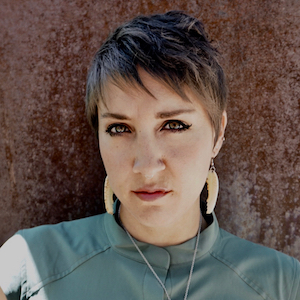

“There was a man who set out to obtain charms.
Going out in a baidarka, he landed in the land he was heading for”
If it were me I’d put a small house on the water
with a bird to carry dry land.
And the bird would be dressed as a man.
That way when the men come for the daughters
they will simply fly away
and when the sons are carried
far from the sea it will be by their own beating
wings their granddaughters will find their way home.
They will say they are filling up.
They won’t say the bodies are filling the sound.
They won’t tell you the ones they hunted
were more or less human
in another time.
Common to the Gulf waters of the people of the island
that is, the island-people:
birds in flight
anadromous fish
three kinds of
three sharks
[including the sleeper, perceived non-threatening. perceived
opportunistic. perceived, consumed, intoxicating.]
also fireweed and
also forget-me-nots
also stone smoothed
also sinkers
and fish with faces
common fish
also with faces
Common to the water and the people of the island
that is, as such stories go:
a girl was not harmed “by the capsizing
or by taking in water, living after that
on the bottom of the sea”
Common to the water
as such stories go:
“if at sea something like a swaddled child appears,
we paddle to it and, passing by it, pull it out from
its wrapping and [so] get safety away from it.”
(One plucks out its clout.)
“However, whoever flees from it will get taken by it.”

In this story all the children live.
I have a great-grandmother and she lives.
I have a grandmother and she lives.
I have a daughter and she lives.
In this story I am not afraid of sleeping
waves.
In this story I am not afraid.
I am not afraid and we live.
We all live.
Each sole of my fine shoes I have torn out
and shaped into a finer boat like one
who knows how to make fine boats and give
them to one’s relatives
one knows how to name
one knows how to believe
one knows they are living
one knows that all the children have not died and are
living still

Qayak ang’uq.
1
The kayak is big.
Don’t turn your back on the water
(that is, the sea, the wave, the rising tide).
Qaik miktuq
2
The body is small.
Don’t turn your back on the water
(that is, the sea, the wave, the rising tide).
Tununiten imami.
3
Don’t turn your back on the water
(that is, the sea, the wave, the rising tide).
Don’t turn your back on the water
(that is, the sea, the wave, the rising tide).
When one is going to hold what one has held before
the bottom of one’s palms itches.
He who is to walk the following day
the sole of his foot itches.
[S]he who is to have sorrow
[her] throat is (feels) full.
For more information about this piece, see this issue's legend.

Abigail Chabitnoy, author of How to Dress a Fish (Wesleyan 2019), shortlisted for the 2020 Griffin Prize and a finalist for the Colorado Book Awards, is a member of the Tangirnaq Native Village in Kodiak. Her poems have appeared in Boston Review, Tin House, and Gulf Coast among others.
40°12′32″N 77°10′41″W
The Carlisle Indian Industrial School in Carlisle, Pennsylvania was the flagship Indian boarding school in the United States from 1879 through 1918. The school grounds, known as the Carlisle Barracks, including grave sites of the children who never left, are now part of the U.S. Army War College. Though I am one descended of Unangan and Sugpiaq ancestors, one of the islands, of the water, as a result of the genocidal undertakings of the US government’s boarding school assimilation tactics I was born and raised an hour from this point of rupture, through which my great-grandfather was relocated.

